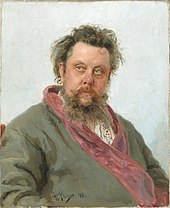Flea song (Mussorgsky)
The Flohlied ( Russian Песня о блохе / Pesnja o Bloche , scientific. Transliteration Pesnja o Bloche ) or the Flohlied of Mephisto or full Russian title Pesnja Mefistofelja w pogrebke Auerbacha ( Песня Мефистофеля в погребке Ауербаха , scientific. Transliteration v pogrebke Pesnja Mefistofelja Auerbacha / Song of Mephistopheles in Auerbach's cellar ) by the Russian composer Modest Mussorgski (1839–1881) was written in 1879. His text describes in a coarse and humorous way political conditions in court life of his time.

The Russian writer Alexander Strugowschtschikow (1808-1878) had composed the text from the Faust by Johann Wolfgang von Goethe (1749-1832). Mephisto sings in the song is one of his king to the Minister appointed flea : "There was once a king who hatt 'a large flea" in a Russian version. In the Russian version, which is otherwise relatively close to the German original, he is dressed in a velvet caftan . Frequent laughter ( cha, cha, cha ... ) was inserted.
In 1879 Mussorgsky quit his civil service and accompanied the contralto Darya Leonova (1829-1896) as a piano accompanist on a tour to southern Russia from August to November . He was very impressed by Leonova's singing and composed the flea song on the trip or shortly after his return to St. Petersburg to dedicate it to the singer.
The sheet music of the flea song was published in 1883, after Mussorgsky's death, by Nikolai Rimsky-Korsakov as editor. It was later orchestrated by Igor Stravinsky (1914).
Originally, the song was for soprano composed, but now it is mostly used by performers of vocal registers bass or bass-baritone sang. The famous Russian singer Fyodor Chalyapin recorded the song several times, as did many other singers.
Texts (Strugowschtschikow / Goethe)
In the following, the Russian text and the German text are compared:
|
--- |
|
|
See also
- Flea literature
- Alexander Nikolajewitsch Strugowschtschikow (Russian)
- Darja Mikhailovna Leonova (Russian)
References and footnotes
- ↑ Alexander Nikolajewitsch Strugowschtschikow ( Russian Александр Николаевич Струговщиков , scientific transliteration Aleksandr Nikolaevič Strugovščikov )
- ↑ Goethe: Faust. The first part of the tragedy, 1808. Auerbachs Keller in Leipzig, Mephistopheles sings
- ↑ Johann Wolfgang von Goethe: Faust. The tragedy first part , verses 2208-2240. The figure of the flea as a state bogeyman and expression of the courtroom is immediately commented in Goethe's poetry by the drinking brothers in Auerbach's cellar: “This is how every flea should fare! / Sharpen your fingers and pack them well! / Long live freedom! Long live the wine! ” (Ibid. Verses 2242–2244)
- ↑ Darja Michailowna Leonowa ( Russian Дарья Михайловна Леонова , scientific transliteration Dar'ja Michajlovna Leonova )
- ↑ cf. Mephistopheles' Song of the Flea
literature
- Hans Christoph Worbs: Modest P. Mussorgsky, with personal reports a. Image documents . (= Rowohlt's picture monographs . 247). Rowohlt, Reinbek 1976, ISBN 3-499-50247-X .
Web links
- Sound sample with notes - Yevgeny Nesterenko / Wladimir Krainew (piano)
- Sound sample - Leonid Charitonow
- Sound sample - Fyodor Chaliapin (1927) (orchestral version)
- Sound sample - George London
- Sound sample - Rudolf Bandler (German text version)